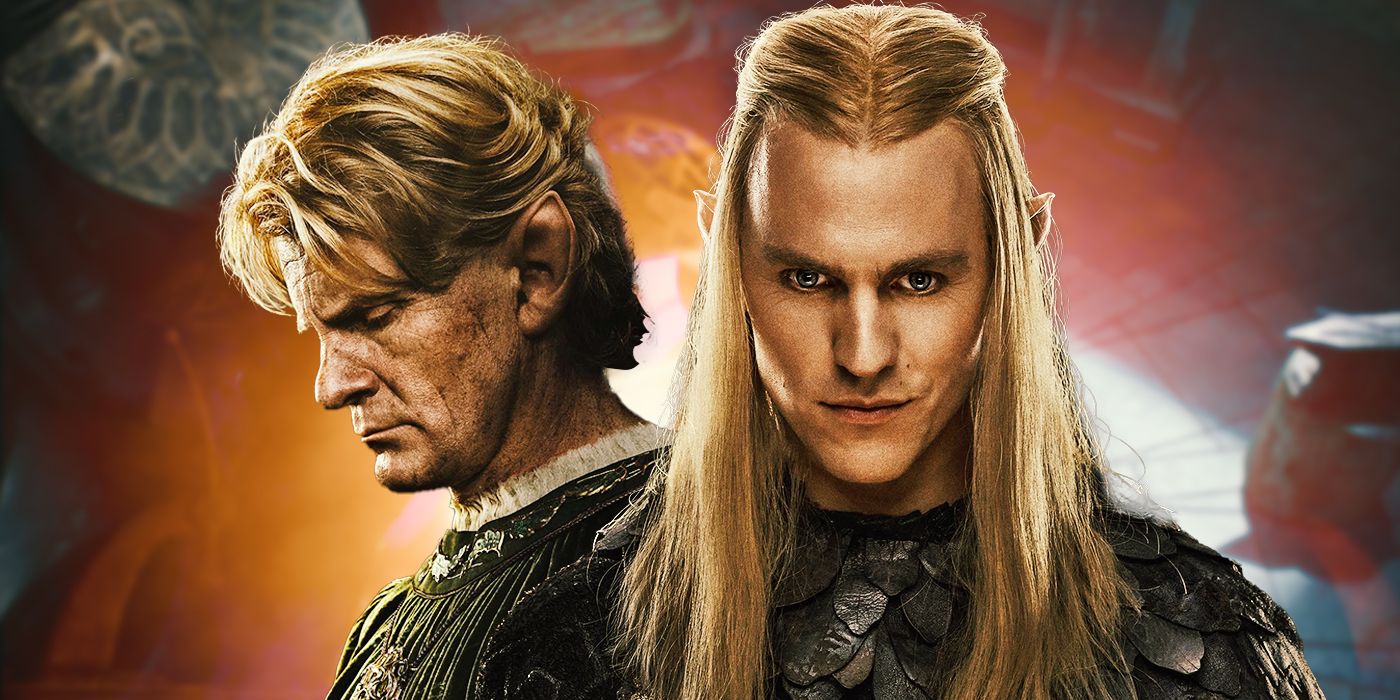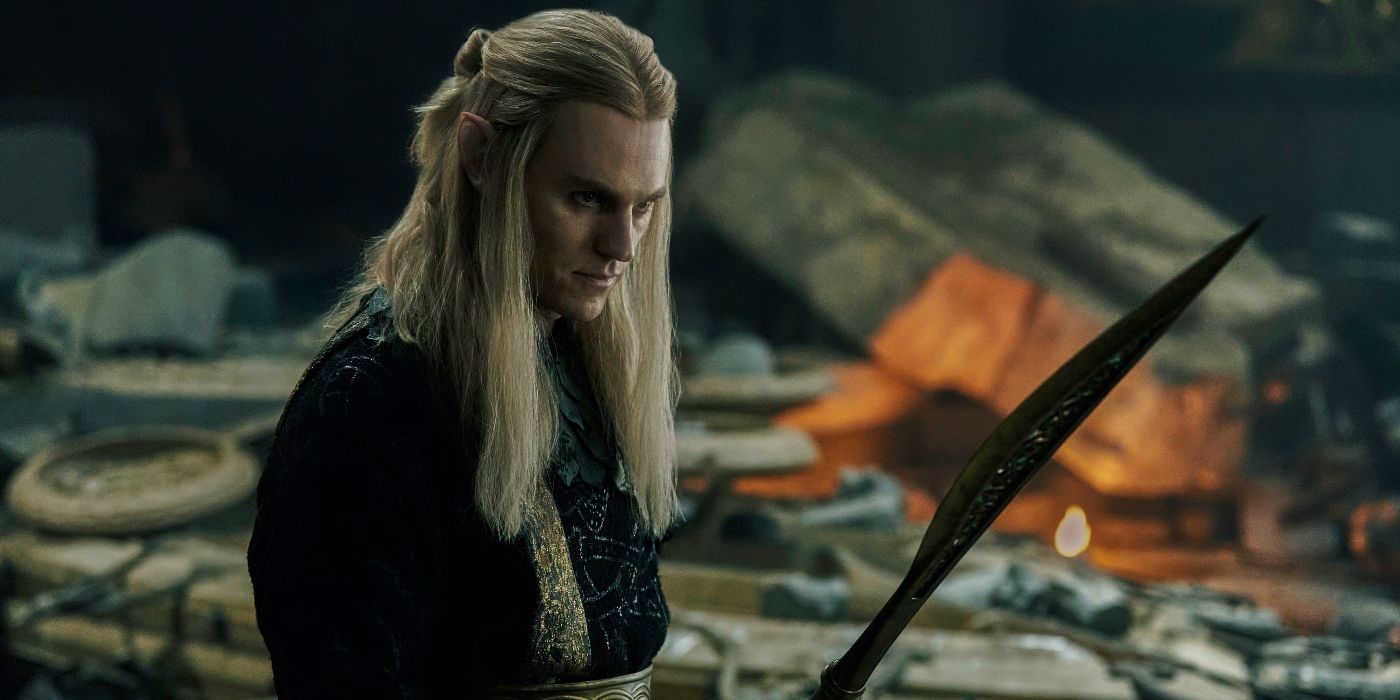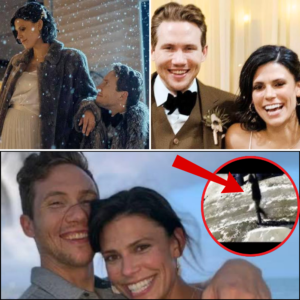
Editor’s note: The below contains spoilers for The Lord of the Rings: The Rings of Power Season 2 finale.
Nothing that happens in the Season 2 finale of The Lord of the Rings: The Rings of Power, “Shadow and Flame,” is as sad as Celebrimbor’s (Charles Edwards) death, but he makes a point of not bowing out gently. After Sauron (Charlie Vickers) stabs and lifts him from the ground, the greatest of Elven smiths taunts the Dark Lord one last time, calling him “the lord of the rings.” This isn’t an idle namedrop for the franchise, of course, and, although there has never been much doubt about who held this title, it’s still important to hear it said in the finale, especially because it isn’t the only time it is mentioned in the series.
Sauron’s Power Over the Rings Grants Him the Title of Lord of the Rings
As Celebrimbor and Sauron trade insults one final time, the Dark Lord screams that he is the creator of the Rings of Power, and that he is their master. He is not wrong, of course. He was actively involved in the crafting of sixteen of them — the seven Dwarven Rings and the nine Rings of Men — and even the three Elven Rings are also connected to him due to how they were forged, using a technique he shares with Celebrimbor at the end of Season 1.
In practical terms, what this means is that all the Rings of Power, although powerful, are also corrupted by Sauron’s involvement. The Seven, for example, are made with mithril that Sauron added himself, turning the Dwarves who bear them into greedy rulers, despite them proving resistant to Sauron’s direct influence. The Nine are even worse, having been made with Sauron’s own blood. In that sense, they are the ones that Sauron is able to actually exert a powerful influence over, and these are the rings that turn their bearers into the wraiths known as Nazgûl, bound forever to both the Seen and the Unseen World.
The Three are free of Sauron’s corruption, but, to make up for that, he forges a master ring through which he can directly influence all others: the One Ring to rule them all. The power of the One, forged entirely by Sauron himself on the fires of Mount Doom, is so great that it is directly tied to all the other nineteen Rings of Power. So much so, that when the One is finally destroyed in The Lord of the Rings: The Return of the King, they all lose their power, becoming simply relics of a dark time. So Sauron’s power and influence on them truly makes him the Lord of the Rings.
Sauron Uses This Title to Tempt Celebrimbor in ‘The Rings of Power’ Season 2

Celebrimbor calling Sauron the Lord of the Rings in “Shadow and Flame” is not the first time this title is mentioned in The Rings of Power. This is what may cause some confusion about whom the real Lord of the Rings is, because, in the second episode of Season 2, “Where the Stars Are Strange,” Sauron uses this title to win over Celebrimbor to his cause of forging more Rings of Power.
“When our work is complete, never again will the world overlook you as the mere scion of Fëanor, but forevermore revere you… The Lord of the Rings.” This is what Sauron, revealing himself to Celebrimbor in his disguise of Annatar, tells Celebrimbor smiths. He really knows which buttons to push with Celebrimbor, because the Elf’s greatest ambition has always been to surpass his grandfather, Fëanor, as the greatest of Elven smiths. Calling Celebrimbor the Lord of the Rings is simply a way to appeal to his pride and vanity, and it works. But still, although Celebrimbor is vital to the forging of the Rings of Power, he holds no power over them, as Sauron does.
‘Lord of the Rings’ Isn’t Really a Respectable Honorific
Having a title like “the Lord of the Rings” certainly sounds epic; not many people can say things like that about themselves. However, Celebrimbor doesn’t mean it as a respectable honorific, but rather as a dark prophecy about what it means for Sauron to be the Lord of the Rings. He foresees that the Dark Lord will become the rings’ prisoner, and that’s indeed what happens.
After his defeat in the War of the Last Alliance, Sauron loses his physical form, and spends most of the Third Age working to regain it. One of the things he does to get his power back is to search for the Rings of Power, mainly the seven Dwarven Rings. Based in the fortress of Dol Guldur, he is able to reclaim three of the Seven, one of them being Thráin’s ring – Thráin being Thórin Oakenshield’s (Richard Armitage) father from The Hobbit. The other four Dwarven Rings are lost to dragons, either eaten or consumed by fire. So it can be argued that Sauron’s powerful connection to the Rings of Power works both ways.
Another hint that “the Lord of the Rings” isn’t a good title to have is in The Lord of the Rings: The Fellowship of the Ring. When Saruman (Christopher Lee) betrays Gandalf (Ian McKellen) and mentions working with Sauron, the Grey Wizard replies by saying: “There is only one Lord of the Rings. Only one. And he does not share power.” Gandalf is talking about Sauron, but not in an honorable way. At that time, this title is a synonym for darkness, further implying how delusional Saruman is.
Season 2 of The Lord of the Rings: The Rings of Power is available to stream on Prime Video.





